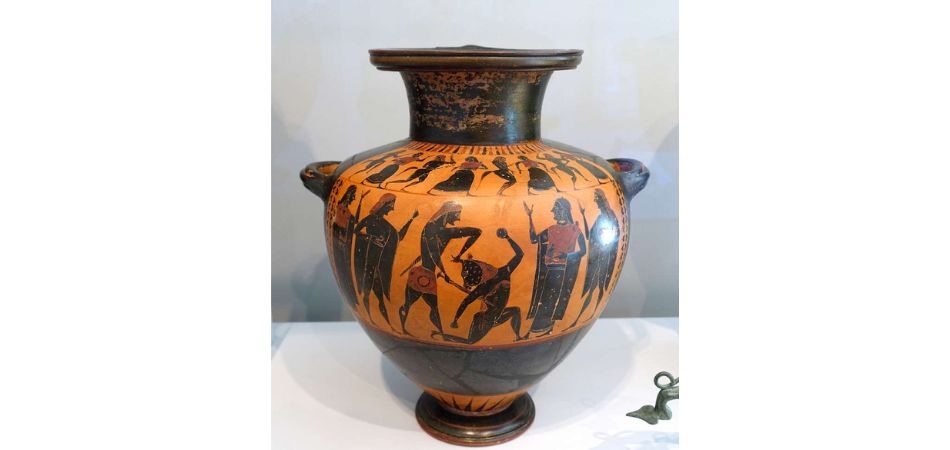
Written by:
Last Updated:
May 29th, 2025

In the annals of ancient history, Ancient Greece stands as a cornerstone of culture, philosophy and entertainment. While the exploits of philosophers, warriors and playwrights have been well-documented, gambling is a lesser-explored facet of Greek life. For the ancient Greeks, gambling and games were not just casual pastimes; they were activities that thrived in the vibrant social hubs and rang through the raucous festivals. But just as gambling and gaming addiction do not discriminate today, “Ludomania”, the Greek term for the conditions, affected every echelon of society, from the wealthiest patricians to the most modest artisans.
This exploration will transport us back to the days of antiquity, where we will unveil the complexity of gaming in ancient Greece. We will investigate the origins of Ludomania, the link between games and the gods and ponder on the philosophical insights provided by the great minds of the time.
The “Vatican Amphora” depicting warriors Ajax and Achilles playing a board game, 550–530 BCE
The prominence of games in Greek society
Games in ancient Greece were deeply rooted in the Hellenic culture and were seen as essential for both personal development and social bonding. Physical contests like those of the Olympic Games were viewed as vital for developing virtues like courage and endurance, while board games tested strategic thinking and sharpened the mind.
Games were also a pivotal part of social gatherings and public festivals, providing entertainment and a sense of unity among citizens. The symposium – an all-male drinking party – was a gathering where games were heavily featured. It offered a space for free-flowing discussions on politics, philosophy and art while accompanied by various gaming activities. Guests would engage in ‘kottabos’, tossing wine lees at targets, and bet on the outcomes, turning a sophisticated social event into an arena of competitive sport.
During festivals like the Panathenaic Games and the Dionysia, gambling was as prevalent as it is today at festivals like Cheltenham. On such occasions, the lines between the sacred and the profane blurred as gaming became a form of honouring the gods. Bets and prizes likely ranged from nominal tokens to substantial amounts of money. The players and gamblers even had two gods on their side: Hermes, the god of luck and commerce, and Tyche, the deity of fortune and prosperity.
“Tyche of Antioch”, 300 BCE
The pantheon of Greek games
Ancient Greece was a mosaic of competitive spirit and intellectual vigour, reflected in its array of games. From athletic contests that tested physical prowess to games of skill that challenged the intellect, the Greeks had a rich repertoire of games often interwoven with gambling.
The Olympics, the most renowned Greek athletic competition, were held in honour of Zeus every four years. While they are mostly remembered for the sporting endeavours of the competitors, betting was a common practice among spectators.
Chariot races and gladiatorial contests, imported to Greece from neighbouring cultures, also became staple spectacles where heavy gambling was commonplace. Games like these were not only forms of entertainment but also opportunities for the wealthy to display their fortune and for the common folk to attempt to improve theirs through wagers.
Gambling activities in Greece were not confined to the high-stakes arenas. In the agora, the central public space in Greek cities, men of all standings would gather to play ‘astragaloi,’ a game played with knucklebones, primitive dice made with the ankle bones of sheep or goats. Another popular game was ‘petteia,’ often likened to chess, a strategy game involving a war-like simulation on a checkerboard.
In the domestic sphere, women and children partook in gaming as well. Games like ‘episkyros’ – an early form of football – and various board games were played for recreation, though gambling was typically less pronounced in these settings.
“Ancient Greek Adolescent Girls at Play” depicting a game of astragaloi, 4th Century BCE
Gambling and the ancient philosophers
While Ludomania was not clinically diagnosed in antiquity, the ancients had a conceptual grasp of the havoc it could wreak on personal well-being. Philosophers pondered on the role of chance and luck in human affairs and whether the stories of the gods, many of whom engaged in wagers and games of chance, were cautionary tales or examples to be followed.
Plato
Plato viewed gambling, when in excess, as a distraction from the pursuit of philosophy and a just life. His allegorical works often hinted at the importance of a guided life where reason triumphed over baser instincts, a philosophy that naturally extended to caution against the potential misguidance of excessive gambling.
Aristotle
Aristotle, in his Nicomachean Ethics, delved into the concept of ‘akrasia’, or lack of self-control, which can be likened to the modern understanding of addiction. While not specific to gaming or gambling addiction, this concept mirrored Plato’s views and highlighted the importance that was placed on moderation and not giving in to impulsive desires.
The Stoics
The Stoics, meanwhile, advocated for ‘apatheia’ – a state of being unaffected by passion and thus impervious to the swings of fortune that gambling epitomised. They would likely argue that the sage, the ideal Stoic, would either abstain from gambling or engage in it with detachment, immune to the emotional turbulence of loss or gain.
The Epicureans
The Epicureans offered a different view, believing that pleasure – albeit moderate and intellectual – was the goal of life. In their view, gambling could have been seen as permissible if it brought joy without harm or addiction, echoing modern sentiments of responsible gambling.
“Bust of Aristotle”. Roman copy in marble after a Greek bronze original by Lysippos, 330 BC
The impacts of gaming and gambling addiction
While direct evidence detailing the personal and social impacts of gambling addiction in ancient Greece is sparse, the philosophical advocacy for moderation and self-control suggests a likely social stigma attached to Ludomania. This stigma may have paralleled the isolation of those with modern gaming addiction, who often retreat into virtual worlds to avoid social judgement or find connections that are missing in their real lives.
Financial devastation is an unequivocal consequence of gambling addiction, and in some Greek societies, the consequences could have been potentially severe. In Athens and Corinth, for example, individuals sometimes resorted to selling themselves or their family members into slavery to pay off debts, and there were likely cases of gambling debts being settled in this way. Even for those who did not have to resort to such extreme measures, the financial duress from gambling addiction likely strained personal and social relationships, eroding the foundational Greek values of community and family.
The mental health ramifications of addiction in ancient Greece also likely mirror those understood today: chronic stress, anxiety and depression. While the Greeks did not have modern medical understanding, they recognised the distress and disruption caused by behavioural addictions, yet no effective treatment or support was available.
There is no statistical evidence to suggest suicide rates among those suffering from gambling addiction in ancient Greece; in modern times, the link between gambling addiction and suicide is well-documented. This grim association likely existed in ancient times, suggesting Ludomania’s timeless and profound impact on mental well-being.
In reflecting on these impacts, we can infer that ancient Greek society, much like today, would have grappled with the complexities of gambling addiction – its silent transition from casual play to psychological dependency – and the insidious erosion of every aspect of an individual’s life.
Final thoughts
As we bridge the chasm of time to glean insights from the ancient Greeks, we uncover the timeless nature of human behaviour in the search for balance between pleasure and moderation. Ancient Greek society celebrated the competition, physical prowess and intellectual stimulation of games and gambling, but Ludomania likely destroyed countless lives.
Today, we benefit from history, the wisdom of philosophy and a deeper understanding of the human psyche. We are better equipped to recognise the signs of addiction, offer support and foster a culture of responsible behaviour. The ancient Greeks laid the foundation for much of our world, and now we must build upon it, ensuring that the joy of gaming and gambling remains untainted by the shadow of addiction.
If you recognise the echo of history in your life, knowing that help is available is crucial. UKAT offers comprehensive gaming and gambling addiction programmes which can help you regain control. Contact us today to begin your journey to recovery.
(Click here to see works cited)
- Clarke, Jim. “The Wild Ancient Greek Drinking Game That Required Throwing Wine.” Atlas Obscura, 19 February 2018, https://www.atlasobscura.com/articles/kottabos-ancient-greek-wine-spilling-game. Accessed 8 November 2023.
- HistoryExtra. “Slavery In Ancient Greece: What Was Life Like For Enslaved People In The Society?” HistoryExtra, 22 September 2021, https://www.historyextra.com/period/ancient-greece/slavery-ancient-greece-life-society/. Accessed 8 November 2023.
- Kidd, Stephen E. “Greek Dicing, Astragaloi and the ‘Euripides’ Throw.” The Journal of Hellenic Studies, vol. 137, no. 1, 2017, pp. 112–18. JSTOR, https://www.jstor.org/stable/26575749.
- Marionneau, Virve, and Janne Nikkinen. “Gambling-related suicides and suicidality: A systematic review of qualitative evidence.” NCBI, 26 October 2022, https://www.ncbi.nlm.nih.gov/pmc/articles/PMC9645554/. Accessed 8 November 2023.
- Wichmann, Anna. “Gambling in Ancient Greece.” Greek Reporter, 11 April 2022, https://greekreporter.com/2022/04/11/gambling-ancient-greece-dice-games/. Accessed 8 November 2023.






